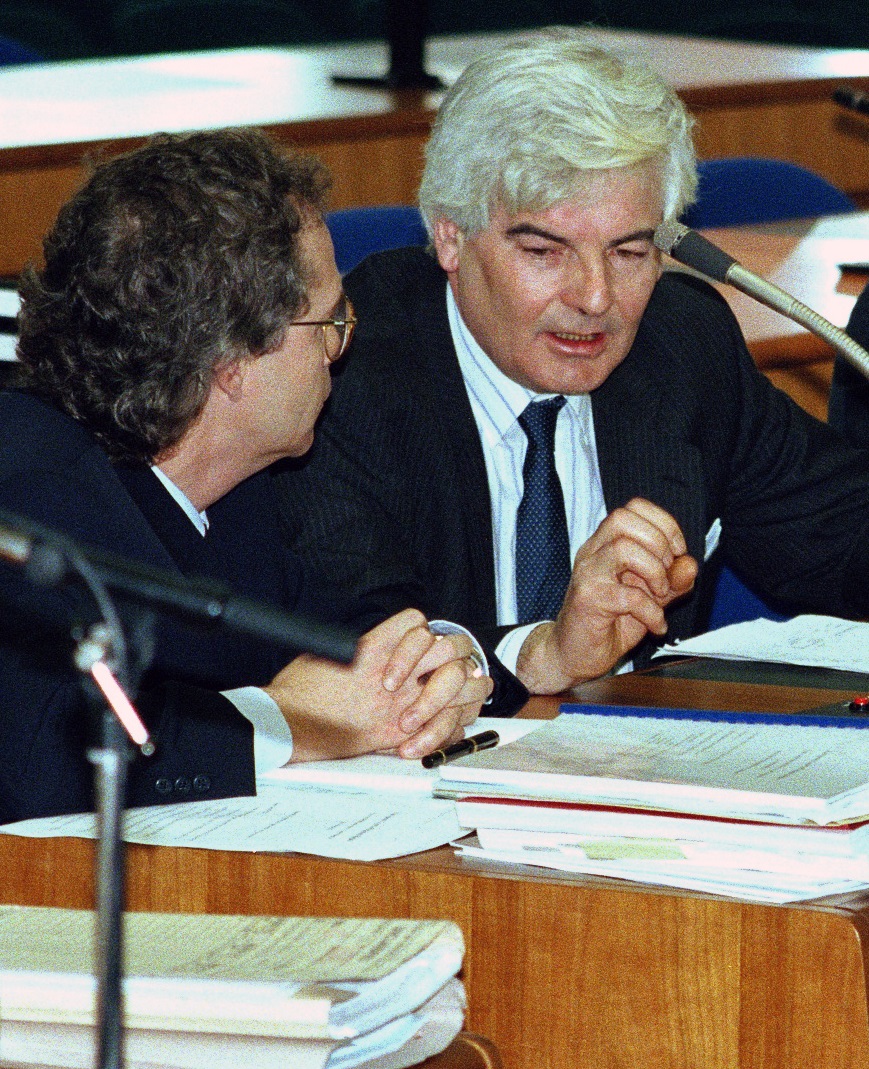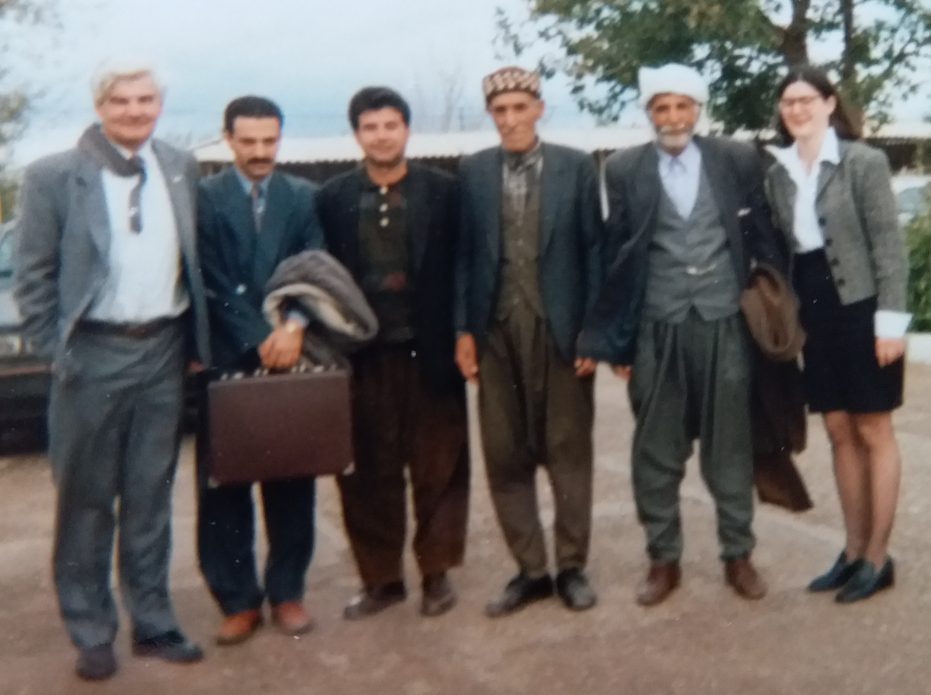Are You With Me?
Kevin Boyle and the Rise of the Human Rights Movement
Eziyet, Chapter 21
Excerpted from Pages 273 to 288
In the summer of 1992 Kevin Boyle, then a professor of law at the University of Essex and head of the university’s Human Rights Center, arrived in Diyarbakır, long the unofficial capital of Turkey’s Kurdish minority. Boyle had been invited to give a talk to local lawyers and human rights activists. His audience in a packed Diyarbakır cinema heard him argue that because the Turkish government, seeking to join the European Union, had finally agreed to grant individuals the right to petition the European Commission of Human Rights and to accept the jurisdiction of the European Court based in Strasbourg, France, recourse to Europe’s human rights machinery was now a viable option for the long-suffering Kurds.

In the following years, Boyle and his colleagues, most notably fellow Essex professor Francoise Hampson, would bring – and win – scores of cases in Strasbourg. The cases exposed the appalling practices of Turkey’s counter-insurgency campaign, put pressure on the Turkish government to modify its behavior, and made a major contribution to the use of international law to redress human rights violations during times of civil unrest. It was, as Boyle later wrote, “one of the most far-reaching initiatives to render state action in violation of human rights accountable internationally”.
There was no shortage of cases. In November 1992, for example, as part of a scorched earth policy, Turkish soldiers burned the village of Kelekçi and ordered Mayor Huseyin Akdivar to tell residents to leave, forcing the destitute inhabitants to live on the streets. At the same time, police in a nearby town arrested journalist Zeki Aksoy on a false tip that he was a PKK member and tortured him for three weeks, hanging him by his arms and administering electric shocks to his genitals, before releasing him. Meanwhile, a tank fired at the home of Ramazan Cagirga in the predominantly Kurdish town of Cizre, killing seven family members.
These incidents, all in the same month, were just the tip of the iceberg. Indeed, as Boyle wrote to his old friend Mary Robinson, then president of Ireland, “the repression and violence on both sides in South-east Turkey is on such a horrendous scale compared with Northern Ireland that it is difficult to credit how little attention it gets compared to our own problems.”
The stories got worse. The most harrowing was that of Şükran Aydin, a seventeen-year-old Kurdish girl detained by police, stripped, hosed with cold water, and then raped by a man in military uniform. Afterwards, she was beaten, warned never to talk about what had happened, and dumped on a hillside near her village.
Boyle and Hampson brought cases on behalf of these and many other victims to the European Court of Human Rights. The two lawyers documented violations of numerous articles of the European Convention on Human Rights. These included Article 8, the right to home and family life; Article 3, the right not to be subjected to torture and cruel and inhuman punishment; Article 13, the right to an effective domestic remedy; Article 14, the right to be free from discrimination; and Article 18, which imposed limits on the power of governments to curtail other rights.
Turkish security forces tried to intimidate the applicants, forcing several to sign statements repudiating their original complaints. When Zeki Aksoy refused to do so, he was murdered. Despite continuing threats, Aksoy’s father insisted on going ahead with case. After meeting with Boyle and Hampson, several other applicants also agreed to proceed.
In all of these cases, and in dozens of others, the two lawyers argued that the use of lethal force, torture, enforced disappearances, and the widespread destruction of villages proved a pattern of sustained human rights violations by the Turkish government. In several cases, the key government witness was Bekir Selcuk, the chief State Security Court prosecutor, ostensibly in charge of investigating such incidents. Stocky, with greying hair, a white moustache and fleshy jowls, Boyle and his colleagues described him as “a self-important thuggish villain.” Under several hours of questioning by Boyle, Selcuk insisted all charges were simply a conspiracy to discredit the Turkish state in which Boyle, he suggested, was a key ringleader.
Boyle, however, in his deliberate, soft-spoken manner, continued his questions. “Kevin was trying to demonstrate that Selcuk was lying,” recalled Hampson, “and Selcuk was getting rattled.” Suddenly the Turkish official shouted: “I have never been treated like this in my entire life!” Boyle calmly took a breath, looked at the Commission members, who remained silent, and said, “That’s a pity, because I intend to carry on. My next question is …” and the interrogation continued.

In almost every case Boyle and Hampson brought, the European Court of Human Rights ruled in their favor, establishing important new principles for international human rights law. In Akdivar, the court ruled that no domestic remedies were available in Turkey’s government-controlled judicial system, opening the door for many more individual cases to be filed. In Aksoy, the Court declared that that where “the individual is taken into custody in good health but is found to be injured on release, it was incumbent on the state to provide a plausible explanation.” Mistreatment in detention, it affirmed, could no longer be ignored.
In the autumn of 1995, a frightened Şükran Aydin arrived in Strasbourg. So deep was Aydin’s trauma that she could not bring herself to use the word “rape,” referring instead to the ‘dirty things’ that had happened to her. In its judgement, the Court ruled that rape was a form of torture. It was a landmark decision, reflecting growing public consciousness about rape in conflict zones, and underscoring the need for legal mechanisms to bring perpetrators of sexual violence to justice. It also helped lay the groundwork for the international tribunals which investigated war crimes in Rwanda and the former Yugoslavia to condemn rape as a tool of war and prosecute those who engaged in it.
In the wake of repeated defeats in Strasbourg, the Turkish government’s treatment of the Kurds gradually improved. However, as Turkey has slid back into dictatorship in recent years under President Recep Tayyip Erdogan, the progress of those days seems a distant memory. Indeed, for Erdogan and other autocratic leaders, violating international norms has become routine. Sadly, the Kurds have yet again become the victims, with many of the legal protections Boyle and Hampson secured for them now ignored, underscoring the increasingly acute need to hold such abusers of human rights to account.
Even for those who did achieve some measure of justice through the efforts of the two lawyers, the pain never went away. Before her rape, Şükran Aydin’s family had already arranged a marriage, which went ahead, despite the deep conservatism of Kurdish society and the “shame” of what had happened to her. After marrying, she had a baby daughter and named her Eziyet. In English, the word means “torture.”
Mike Chinoy was a long-time CNN foreign correspondent, serving as Beijing bureau chef and Senior Asia Correspondent. He is currently a Non-Resident Senior Fellow at the University of Southern California’s US-China Institute. His new book is Are You With Me? Kevin Boyle and the Rise of the Human Movement. Free worldwide shipping is available.